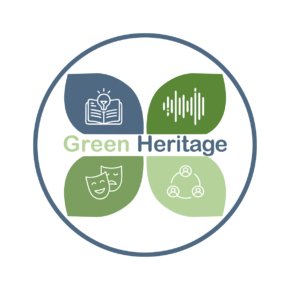GreenHeritage aims at developing a holistic, innovative and inclusive approach toward direct and indirect climate change (CC) impact on intangible cultural heritage (ICH), a topic which has received little or no attention at all. GreenHeritage is a large-scale project that fosters innovation through practice, by researching and adopting a new methodology that touches on different sectors, and policy, by disseminating research findings and impacting policies at national and European levels. The project will be implemented in 5 European countries (Belgium, Greece, Italy, Latvia and Spain).
General aims
General objectives
The project seeks innovative tools and methodologies able to promote adaptive and systemic approaches to better manage CC. The GreenHeritage aspires to function as an urgent reminder that climate change is present, affecting both directly and indirectly all aspects of Europe’s cultural heritage.It is also an urgent call to stir up collective action.
CMCC role
BENEFICIARY
The Consortium is established by 10 partners from five different countries to ensure the effective collaboration between research, business and academia. CMCC is a Project partner and leads task 2.3 ‘Development of methodology’ in WP2 ‘Needs analysis & development of GreenHeritage methodology’, and task 5.2. ‘Stakeholder analysis’ in WP5 ‘Policy dialogue, dissemination and exploitation’.
Activities
“Needs analysis & development of GreenHeritage methodology” this activity aims to:
- take stock of different definitions of ICH at national (Greece, Italy, Latvia and Spain) and EU levels and provide a common definition;
- capture data in partner countries and across EU regarding types of threats linked to climate change;
- provide causal link or probability of causation between climate change and ICH degradation;
- detect and map existing management, conservation and protection practices across EU;
- provide a methodology for the adaptation of ICH to threats linked to climate change.
“GreenHeritage ICT tools” this activity aims to:
- create a high-level virtual environment for sustainability professionals, thus enhancing their learning experience;
- provide the means for the transferability of the GreenHeritage course;
- provide ICT support throughout the implementation of the project.
“GreenHeritage course: Blended-learning & Microcredentials” this activity aims to:
- introduce a mixed educational approach while offering high-quality digital content and overall learning experience;
- •create a modern, innovative and transferable training tool for the upskilling of sustainability professionals while reaching for a broader audience;
- create synergies among learners and partner organizations.
“Policy dialogue, dissemination and exploitation” this activity aims to:
- produce a comprehensive and viable Dissemination plan including project visual identity;
- create and maintaining the project website as a focal point for project information;
- produce dissemination material (newsletter, leaflet, teasers, articles, social media communication etc.);
- organise transnational policy roundtables that will bring together Quadruple Helix stakeholders from the relevant sectors;
- produce recommendations for national and EU policy makers in the relevant sectors.
Expected results
It will produce the following key results:
- a methodology for the management, preservation and protection of ICH in the face of CC based on a needs analysis in partner countries but also across EU;
- an interactive map showing examples of the most endangered areas and regions in Europe where CC has started to impact negatively different types of ICH;
- a blended learning program on ICH and CC consisting of 4 online modules and 4 transnational physical workshops, targeting cross-sectoral PhD candidates, researchers, and policymakers & practitioners;
- a micro-credentials programme on ICH and CC consisting of 4 online modules targeting a broader audience;
- 5 policy roundtables and a final conference bringing together scientists, researchers, community leaders and policy makers;
- 5 policy briefs, and a handbook on the state of play of ICH and CC impact at EU and national levels including key project results and final recommendations for policy change;
- a long-term action plan ensuring transferability of project results. Throughout the implementation at least 500 direct and indirect stakeholders at all levels will be informed on project results, at least 150 learners will have subscribed to the e-learning platform and at least 150 participants will have attended the final conference.
Partners
- CNR – CONSIGLIO NAZIONALE DELLE RICERCHE
- CUEBC – CENTRO UNIVERSITARIO EUROPEO PER I BENI CULTURALI ONLUS
- FONDAZIONE CMCC – FONDAZIONE CENTRO EURO-MEDITERRANEO SUI CAMBIAMENTI CLIMATICI
- FSMLR – FUNDACION SANTA MARIA LA REAL DEL PATRIMONIO HISTORICO
- ReadLab P.C. – RESEARCH INNOVATION AND DEVELOPMENT LAB PRIVATE COMPANY
- ILFA LU – LATVIJAS UNIVERSITATES LITERATURASFOLKLORAS UN MAKSLAS INSTITUTS LATVIJAS UNIVERSITATES AGENTURA
- UAEGEAN – PANEPISTIMIO AIGAIOU
- CANDIDE – CANDIDE INTERNATIONAL BV
- ELORIS S.A. – ETAIREIA EREYNAS, EKPAIDEYSHS, KAINOTOMIAS KAI ANAPTYXHS THS PERIFEREIAS BOREIOY AIGAIOY AE
- ALLI – ATHENS LIFELONG LEARNING INSTITUTE ASTIKI MI KERDOSKOPIKI ETAIRIA



